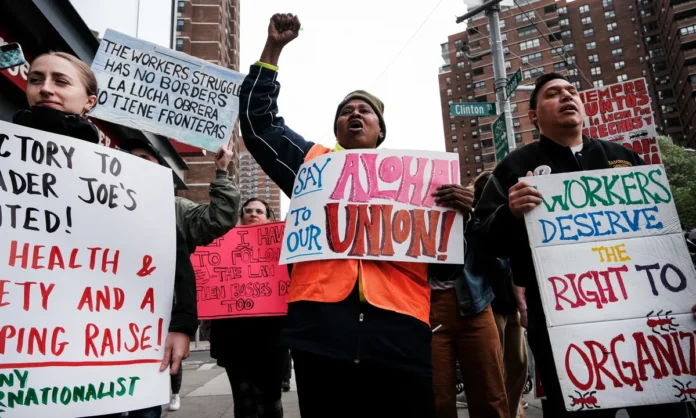By Zhong Sheng, People’s Daily
Mounting global criticism is coalescing around a familiar concern: the United States is once again weaponizing tariffs as a tool of economic coercion. Experts warn that sweeping U.S. tariffs will deal a heavy blow to African economies, while ASEAN nations have openly denounced America’s unilateral tariff escalations.
Equally troubling, observers argue that these arbitrary tariffs not only threaten global economic stability but also signal a deliberate attempt of the U.S. to reassert its old hegemonic influence in Latin America and the Caribbean.
Among the countries on Washington’s “tariff coercion list” are some of the world’s most vulnerable economiessuch as Lesotho, recognized by the United Nations as one of the least developed nations, and Fiji, a Pacific island country with a fragile, narrowly based economy. This reckless move is sending shockwaves across the Global South.
In a bid to preserve its economic dominance, the U.S. has wielded the tariff stick, infringing upon and undermining other countries’ development rights and interests. This approach reveals its troubling indifference to international morality and responsibilities,exposing the underlying selfishness and hypocrisy of U.S. hegemony.
Driven by the belief in”might makes right,” the U.S. continues to pursue economic unilateralism – seeking gains at the expense of less developed countries. Such action not only erodes the development rights and interests of Global South countries but also undermines the efforts to build a more inclusive global economy.
UN Secretary-General Antonio Guterres warned that trade wars are extremely negative, especially for the poorest people in the world. Data analysis from the World Trade Organization indicates that, amid economic disparities and unequal power dynamics, U.S. tariff policies will exacerbate the wealth gap among nations, with less developed countries facing particularly severe repercussions. This trend poses a significant threat to the efforts intended to achieve the UN 2030 Agenda for Sustainable Development.
The U.S. deliberately ignores the true development conditions of developing countries, distorting the causes behind trade deficits to justify its sweeping, unilateral tariffs. Its irresponsible action strips other countries, particularly those of the Global South, of their development rights and interests.
As the world’s largest economy, the U.S. has reaped immense profits from the global division of labor. Yet even as it benefits from globalization, it brazenly undermines very rules that make it work – flouting international trade norms, disregarding the intricate web of global industrial and supply chains, and casting aside the principles and purposes of the multilateral trading system. This behavior has inflicted deep and lasting harm to the economies and livelihoods of countries in the Global South.
An onslaught of tariffs by the U.S. will send “shock waves” through African economies, Akinwumi Adesina, president of the African Development Bank, recently said, warning of reduced trade and higher debt-servicing costs.
The international community must not remain silent in the face of economic bullying and coercion. As the largest developing country and a responsible member of the international community, China has taken legitimate countermeasures to defend its sovereignty, security, and development interests. These actions are not only about protecting China’s own rights and interests – they are about standing up for the integrity of international trade rules, and for international fairness and justice. That stance has resonated across the Global South, where support for a more equitable global trading order continues to grow.
At the second meeting of the BRICS Contact Group on Economic and Trade Issues, participants expressed serious concerns over the trade tensions triggered by U.S. measures, and jointly called for opposition to unilateralism and trade protectionism. Reaffirming their commitment to the rules-based multilateral trading system, they emphasized the need for collective action to address the pressing challenges facing global trade today.
China stands firmly against trade protectionism and advocates a universally beneficial and inclusive economic globalization. It is committed to advancing global development through trade, narrowing the development gap between the North and the South, and supporting the industrialization of other developing nations through tangible actions. For instance, it has given all the least developed countries with which it has diplomatic relations zero-tariff treatment for 100 percent tariff lines, expanding unilateral openingto the least developed countries to achieve common development.
China will continue to advance high-level opening up, steadily expanding institutional opening up with regard to rules, regulations, management, and standards. By sharing development opportunities with the rest of the world, the country aims to create win-win outcomes and achieve common development.
In its recently released Trade and Development Foresights 2025 report, UNCTAD underlined the growth of South-South trade, which accounts for about one third of global trade, as a source of resilience and a buffer against uncertainty. The development of China has been promoting “a steady growth of South-South trade,” the report said, adding that the potential of South-South economic integration offers opportunities for many developing countries.
History must not be reversed, and humanity must never return to a world where the strong prey on the weak. In today’s era of deepened economic globalization and interconnected international production networks, countries of the Global South are not only important contributors to the global economy but also crucial defenders of international economic and trade rules as well as the multilateral trading system. Any attempt to reverse this progress is doomed to fail.
(Zhong Sheng is a pen name often used by People’s Daily to express its views on foreign policy and international affairs.)
